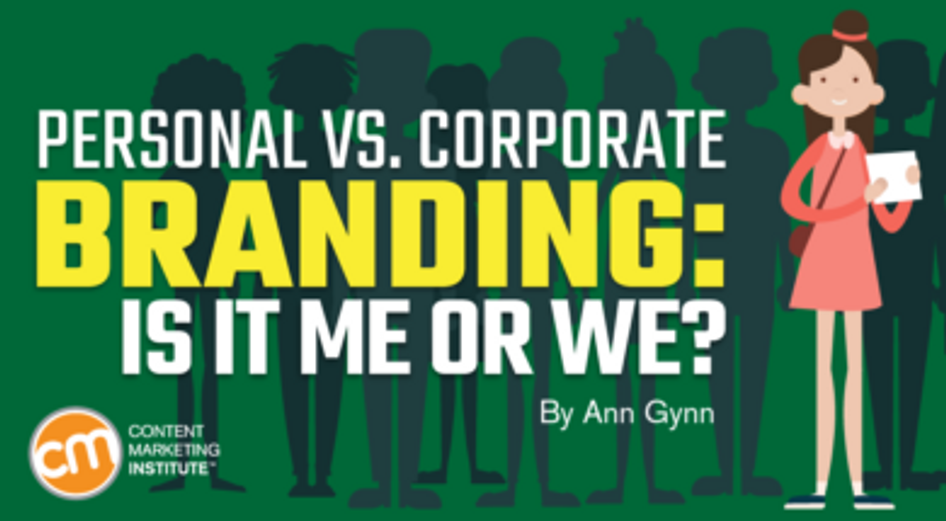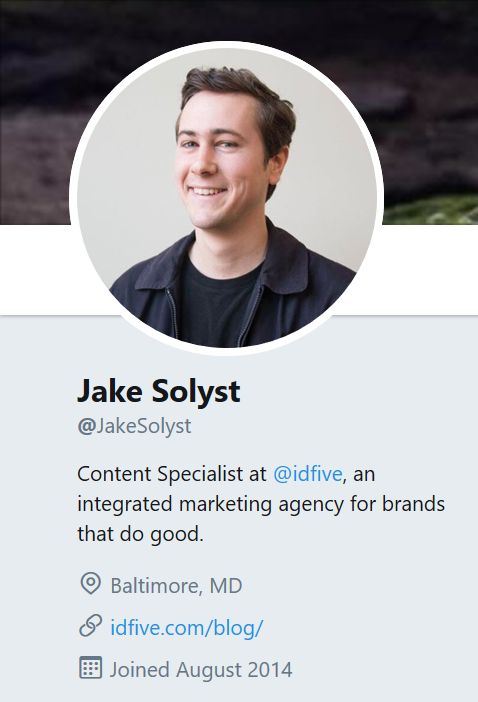Personal vs. Corporate Branding: Is It Me or We?
- Fahad H

- Feb 19, 2018
- 7 min read

Sitting in a staff meeting, my boss asked if there were any questions. I mentioned seeing a job posting online for the marketing department and wondered if the team was expanding.
Several co-workers quickly interjected, “Why were you reading that? Are you looking for a new job?”
“No,” I replied. “I just like to keep tabs on what’s happening in the marketplace.”
That was 15 years ago. I doubt that conversation would go the same way today because most people have an online presence through social media and use the internet for information gathering.
As the rise of social media and influencer marketing has led to exponential opportunities for content marketing for corporate brands, it also has presented countless opportunities for content marketing for personal brands.
But how do the two work in harmony? Should they? Should people closely connect their brand to their employers? Should companies actively encourage their employees to use content marketing, including social media, to talk about the company?
Eight years ago, Christian Crumlish, then director of consumer experience at AOL, outlined the concerns of the employer – they don’t want to make star employees visible and expose them to poaching from competitors, and they are concerned those star employees will outshine the corporate brand.
Given the billion-plus active on social media now, the option to discourage or ban employees from talking about their employers publicly isn’t realistic.Discouraging or banning employees from talking about their employers publicly isn't realistic, says @AnnGynn. Click To Tweet
“It’s not only possible – but highly advantageous – to leverage the power of personal brands in conjunction with (or instead of) the central corporate brand,” writes Jayson DeMers, a Forbes contributor.It's advantageous to leverage power of personal brands in conjunction w/ central corporate brand. @jaysondemers Click To Tweet
As Jayson explains, telling your corporate brand stories through a personal brand (i.e., your employee) allows for more trust with the audience, a distinct voice, a difference from your competitors, an extended reach, and lasting power.
Nurturing employees’ personal brands also is an attractive selling component in the recruiting component as it indicates the company cares about developing the people who work for it.
And employers still worried their employees will take off for greener pastures should turn their focus to the positives. Sure, employees may leave the company, but they will do that with or without your support. If the company helped nurture their personal brand, they may attain positions at other brands that could benefit their previous employer or, at a minimum, they will speak well of the company.
Consider the example of Hallie Warner. She spent years developing her personal brand around her professional identity as chief of staff at Adam Hergenrother Companies. “I use the corporate brand and story to share my own,” she says.
About 18 months ago, she launched her own blog, Lead and Assist, and was invited, along with her boss, to speak at the Behind Every Leader conference. “These branding efforts have put me on the map as an expert for executive assistants and other chiefs of staff, and administrative professionals,” Hallie explains.
In addition to her chief-of-staff position, Hallie is now working as a coach and trainer for executive assistants through Adam Hergenrother Training.
Overall, supporting employees to develop their digital profiles is good for the bottom line. Research from Weber Shandwick shows employees with socially encouraging employers are significantly more likely to help boost sales (72%) than those with employers who are not socially encouraging (48%).Employees who have socially encouraging employers help sales more than those who don't. @WeberShandwick Click To Tweet
What should the company do?
If you want your employees (and their personal brands) to boost your corporate brand, you must be strategic. Here are a few essential steps.
1. Set easy-to-follow, practical guidelines
Sure, you must protect the brand, especially if it’s a publicly traded company, from employees disclosing proprietary or confidential information. Just don’t use that as a reason to go overboard with restrictions in your social media policy.
Check out this employee social media policy from Intel:
Disclose your relationship to Intel.
Protect Intel.
Use common sense when posting.
“What do our policies mean? They mean we trust you … You are both the person in the best position to tell the world why Intel is such an amazing place to be and the person best suited to protect Intel from harm. Don’t slam Intel or our competitors … When you are online, you are representing Intel: our peoples, our values. There is no room for bigotry, prejudice, misogyny, or hatred in our company or on our associated social media feeds.”
TIP: Post your employee social media guidelines online to be transparent internally and externally. If a problem arises, you can easily reference and link to it when you address the issue.Post your employee #socialmedia guidelines online to be transparent internally and externally, says @AnnGynn. Click To Tweet
HANDPICKED RELATED CONTENT:
2. Don’t restrict at-work access to social media websites
In some workplaces, employees are unable to access Facebook, Twitter, Instagram, etc., because of restrictions enforced by IT-related controls. But if you want your employees to grow their personal brand in concert with your corporate brand, you must trust them enough to give them access to social media during their workday. Otherwise, they will build their personal brands without your corporate brand (or worse, with negativity toward their employer).You must trust employees enough to give them access to #socialmedia during their workday, says @AnnGynn. Click To Tweet
TIP: Apply this principle to all employees. If you cherry-pick only those who you want to elevate your brand, you’ll alienate the other employees (who also are on social media and now more likely to talk negatively about their employer).
TIP: As a marketer, you likely don’t have the ability to set company-wide policy. Get your HR leaders involved in the process. Persuade them using credible resources they’re familiar with, such as this comprehensive toolkit on workplace use of social media from the Society for Human Resource Management.
3. Make it easy and attractive for employees to tell your brand’s stories
Allowing your employees to talk about your brand on social is a first step. Encouraging them to tell your brand story is the next step. Offer your employees an opportunity to suggest ideas or get involved in other ways in the content you’re creating and sharing. Tell the stories they think should be told.
Share your editorial calendar with employees so they can know what you’re writing about and when. Send a weekly update with suggested tweets or posts referencing your content to all employees and ask them to share.Send weekly updates w/ suggested tweets & posts to employees and ask them to share, says @AnnGynn. Click To Tweet
HANDPICKED RELATED CONTENT: 6 Steps to Get Your Whole Company Involved in Content Marketing
4. Recognize employees who contribute to your corporate brand’s content marketing
Monitor those people who choose to be active supporters of the brand’s storytelling. Recognize those individuals whose contributions lead to the most shares, most retweets, most conversions (whatever measurement you choose). Acknowledge their work in a company email or newsletter. Send a handwritten note thanking them for their contributions.
HANDPICKED RELATED CONTENT: How to Create a Marketing Team That Cares About Revenue
What should the employee do?
“If you want to succeed in the workplace, you need a well-defined personal brand that supports the company’s mission,” says Dan Schawbel, a Monster contributor.
Though some jobs may not require a well-developed personal brand, many do. Jake Solyst is a content specialist for a 40-person marketing agency, idfive, that focuses on mission-based clients such as universities, nonprofits, and advocacy organizations.
He actively connects his personal branding efforts to industries of the agency’s clients. His personal Twitter profile is focused on his employer, including a link to the company blog – which features many of Jake’s articles.

Jake says he participates in a weekly Twitter chat for higher-education marketers, and tweets from industry-related events and volunteer opportunities. He also reads books about higher education and social issues, then shares his thoughts about them on his social media channels.
“It’s important to be more than a marketer, but a marketer with a passion for and an understanding of the ideas, services, and people we’re promoting,” he says.It's important to be a marketer w/ a passion for the ideas, services, & people we're promoting. @JakeSolyst Click To Tweet
How can you build your personal brand that also works for your employer’s brand? Here are some steps to accomplish that.
1. Know your company’s mission and your mission
Dan’s advice about a well-defined personal brand being essential for workplace success is good, but to do that you need to know your company’s mission. You also need to understand your personal mission or purpose. What are the goals for your personal branding effort? How do those goals fit with your company’s purpose?
HANDPICKED RELATED CONTENT: Your Brand Needs a Point of View, But Do You?
2. Build your personal brand in concert with your employer’s brand
Don’t become a shill for your employer, hawking every product or even every piece of news or story from the company. That won’t win you anything. And don’t ignore your employer in your content – that won’t win you any fans at your company. Strike a balance, incorporating relevant company content when appropriate and ensuring that you share your personal and others’ content too.
HANDPICKED RELATED CONTENT: 60+ LinkedIn Profile Tips for Marketers
3. Raise your profile in your industry
Create or share content around topics and interests specific to your industry and your role or department. Investigate speaking engagements at industry-related or community-based events.
HANDPICKED RELATED CONTENT: LinkedIn Publishing Trends Every Marketer Must Know
4. Reach out proactively to your company
Check regularly with key stakeholders to learn about what’s happening within the company, what they’re hearing about in the industry, and to discover new research being conducted. Consider this group an invaluable editorial advisory board for potential ideas to write about or share.
Inform your supervisors and executives of your personal branding efforts that they may not be aware of. For example, tell them about a speaking opportunity you’re doing at a community meeting or let them know about your blog.
5. Avoid polarizing and controversial issues unrelated to your brand (personal or corporate)
Though you likely have opinions on politics, religion, etc., resist sharing them in the professional setting. You don’t need to spark a debate that detracts from the focus of your intended personal brand.Resist sharing opinions on politics or religion in the professional setting, says @AnnGynn. Read more >> Click To Tweet
TIP: Even references to political or religious figures meant to be humorous can be harmful. An off-handed description in place of the words “U.S. president,” for example, can elicit reader comments and criticism.
It’s really about both
The question of personal brand vs. corporate brand can’t be an either-or option. A personal brand is intrinsically tied to the employer brand and vice versa. Both are critical to each other’s success. Understanding that is the first step, embracing it through proactive policies and promotion is the next. Then both employees and employers have a better one-two branding punch.
Grow your personal content marketing skills and strengthen your company’s content marketing at the same time. Attend Content Marketing World Sept. 4-7 and register today using code BLOG100 to save $100.
Cover image by Joseph Kalinowski/Content Marketing Institute




Comments